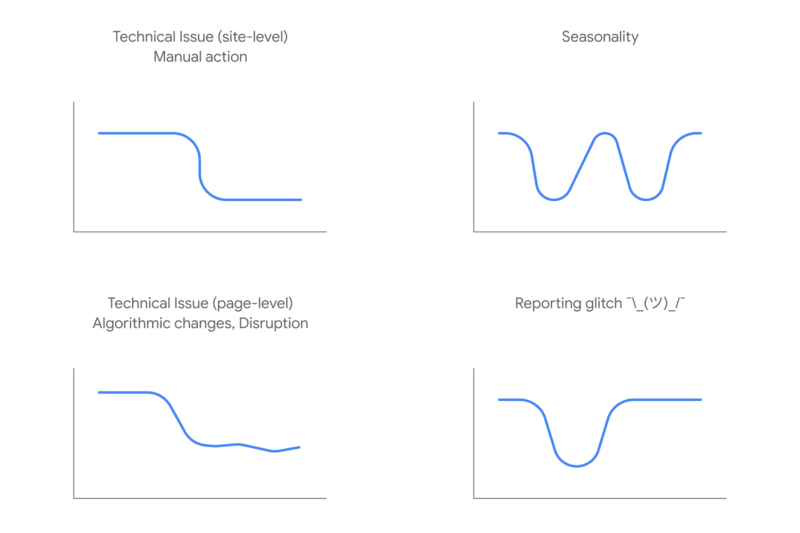This is the first time Google illustrated what different types of traffic drops look like.
Daniel Waisberg, a Search Advocate at Google, described and illustrated what various types of organic search traffic drops look like in the performance reports in Google Search Console and how you can address those traffic drops.
Types of traffic drops. Google posted sketches of “examples of drops and what they could potentially mean.” This shows you visually what a site-wide technical issue or a manual action looks like compared to normal seasonality in search traffic, compared to a technical issue on a page level or an algorithm change (like a core update) or simply a reporting glitch in Search Console.
Here are those sketches:

With technical issues that are site-wide and manual actions where a Google employee gives you a manual penalty, you can generally see a massive drop off in your organic search traffic from Google. This is illustrated in the image at the top left above.
With technical issues that are on a page by page basis or an algorithm change like a core update, you would see a slower decline in your traffic, and it would then level off over time.
Then there are seasonality changes that you see recover with the change in seasons for your business cycles. Also, Google has been known to have reporting glitches in Search Console, where you see things bounce back to where they are.
How Google defines these categories. Here is how Google defined these categories of traffic drops:
- Technical issues: Errors that can prevent Google from crawling, indexing, or serving your pages to users – for example server availability, robots.txt fetching, page not found, and others. Note that the issues can be site-wide (for example, your website is down) or page-wide (for example, a misplaced
noindextag, which would depend on Google crawling the page, meaning there would be a slower drop in traffic). - Security issues: If your site is affected by a security threat, Google may alert users before they reach your site with warnings or interstitial pages, which may decrease Search traffic.
- Manual Actions: If your site does not comply with Google’s guidelines, some of your pages or the entire site may be omitted from Google Search results through a Manual Action.
- Algorithmic changes: Google is always improving how it assesses content and updating its algorithm accordingly; core updates and other smaller updates may change how some pages perform in Google Search results. To keep track of future updates, subscribe to our Google Search News YouTube series or follow us on Twitter.
- Search interest disruption: Sometimes changes in user behavior will change the demand for certain queries, either as a result of a new trend, or seasonality throughout the year. This means your traffic may drop simply as a result of external influences.
What to do. The remainder of the blog post from Google dives into how to dig into the reports to analyze your search traffic drop. This way you can understand which category your traffic drop falls into. Was it a reporting bug or an algorithmic update or maybe it was a Google manual action.
Why we care. I believe this was the first time Google described visually how various issues in Google Search can impact your traffic. It gives you a way to clearly see what to expect from various SEO issues and how your traffic may be impacted.
It is important to note that these illustrations are generalizations and that you do need an experienced SEO consultant to diagnose any real issues with your website.





